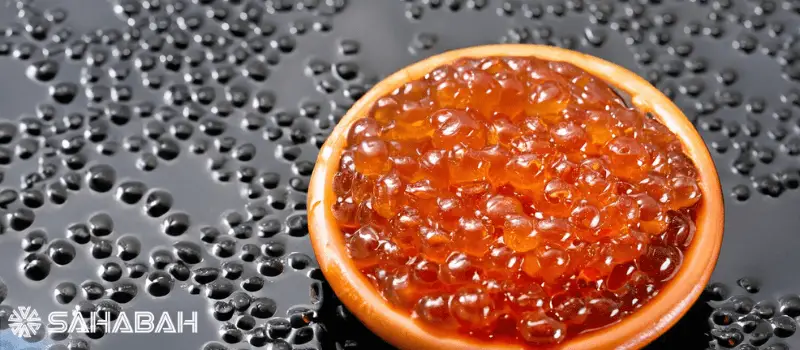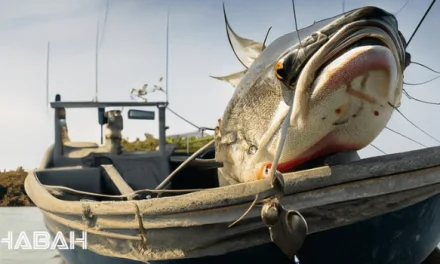As a lover of fine cuisine and a devout follower of Islamic principles, I have always been intrigued by the mysterious world of caviar. However, as a Muslim, I have often wondered about the halal status of this exquisite delicacy, so join me as we delve into the fatwas, Islamic perspectives, and surprising discoveries to unveil the truth behind the halal status of caviar.
Is Caviar’s Indulgence Compatible With Halal Principles
Caviar is a luxury food item consisting of salt-cured fish eggs from sturgeon and other fish species. It is well-known for its delicate flavor and association with fine dining. However, there has been some debate within Muslim communities over whether caviar is permissible to eat according to Islamic dietary laws.
Definition and Types of Caviar
Caviar typically refers to the roe (eggs) from fish such as:
- Beluga sturgeon
- Ossetra sturgeon
- Sevruga sturgeon
These eggs are carefully extracted and then cured, resulting in the signature caviar “pearls.”
| Type of Caviar | Source Fish | Color |
|---|---|---|
| Beluga | Beluga sturgeon | Dark gray to black |
| Ossetra | Ossetra sturgeon | Brown to golden brown |
| Sevruga | Sevruga sturgeon | nearly black to very dark brown |
“Caviar is a delicacy consisting of salt-cured roe of the Acipenseridae family.”
Brief background on islamic dietary laws
- Halal refers to foods that are permissible to eat under Islamic law
- Haram refers to foods that are forbidden
- Guidelines on what is halal/ haram come from the Quran and hadith
- Generally, fish are considered halal, while certain other animals are haram
“In Islamic dietary laws, there are two broad categories of food: halal (lawful) and haram (prohibited).” (Source)
This background provides context on why there is debate around whether caviar, as a fish product, is halal or potentially haram.
Arguments that caviar is halal
There are several arguments made in favor of considering caviar as permissible to eat under Islamic dietary laws.
Caviar comes from fish, which are generally considered halal
- Sturgeon and other fish species used for caviar are aquatic animals, which are halal according to most scholars
- The Quran explicitly allows consuming fish
“All aquatic animals are halal to consume for Muslims.” (Source)
“Lawful to you is game from the sea and its food as provision for you and the travelers.” (Quran 5:96) (Source)
Most scholars agree caviar is halal
- Majority opinion among Islamic scholars is that caviar is permissible
- Hanafi and Shafi’i scholars in particular argue caviar is halal
“The majority of Indo-Pak scholars have ruled caviar to be Halal.” (Source)
“With the exception of the Malikis, the other Sunnis schools (Hanafi, Shafi’i, and Hanbali) do not make a distinction between the fish egg that is fertilized and non-fertilized. They believe that fish roe is permissible.”
The fish eggs used for caviar are not fertilized, which makes them permissible
- Fertilized eggs are seen as more questionable by some scholars
- But most caviar comes from fish eggs that are not fertilized
Caviar was considered haram in the past due to the alcohol used in processing, but most modern caviar production does not use alcohol
- Previously, caviar processing involved alcohol, which is haram
- Today, caviar can be purchased that is processed without alcohol
Arguments that caviar is haram
While the majority opinion seems to be that caviar is halal, there are some arguments made Muslims should avoid that caviar.
Some argue that since caviar comes from fish eggs, it should be considered haram
- Fish eggs are seen as a questionable part of the fish by some
- The Hanbali school prohibits fish eggs
“Some scholars belonging to the Hanbali School of Islamic law prohibited sturgeon caviar claiming that the roe (fish eggs) is not a part of the fish that is permissible to eat.” (Source)
There is debate over whether the fish eggs must be fertilized to be haram
- The Maliki school differentiates between fertilized and unfertilized fish eggs
- They only allow eggs that are not fertilized
- Some argue even unfertilized eggs have potential for life and should be avoided
“Under classical Maliki law, only fish eggs that are still unfertilized are considered permissible to eat.”
Some argue that certain caviar production methods may still use alcohol, rendering it haram
- There are claims some producers may use alcohol to alter taste, color etc.
- It can be difficult to verify caviar production methods, so caution is advised
“Some alcohol may be used in the processing of certain caviar to alter the presentation like taste, color, etc. So Muslims have to be careful in selecting halal caviar.”
While these arguments represent a minority opinion, they suggest further careful consideration may be needed, especially for more conservative Muslims.
Is Caviar Halal – FAQ
Yes, caviar is generally considered halal. Caviar refers to the salt-cured eggs of various fish species, with the most famous being sturgeon. According to Islamic dietary laws, fish is permissible to eat. As long as the fish used for caviar comes from a species considered halal, the caviar made from it would also be halal.
DO sturgeon and caviar come from halal fish?
Yes, caviar can come from halal fish. Halal fish have scales and fins, and some species of sturgeon, such as the Beluga sturgeon, have scales. However, it is essential to ensure that the caviar is produced and handled halal, adhering to Islamic guidelines and avoiding contamination with haram substances.
What does Islam say about caviar?
Islam allows fish consumption with scales and fins, making caviar permissible to eat as long as it comes from a halal source. Islamic dietary laws focus on the permissibility of the main food item (in this case, the fish) rather than the specific form it takes (caviar).
Can Muslims eat caviar?
Yes, Muslims can eat caviar as long as it is sourced from a halal species of fish and prepared in a halal manner. Muslims should check the sources and certifications of the caviar they consume to ensure its halal status.
Is Beluga caviar halal?
Beluga caviar can be halal if it comes from a Beluga sturgeon fish that has scales. As mentioned, fish with scales are considered halal in Islamic dietary laws. However, the halal status also depends on how the caviar is produced and handled following Islamic guidelines.
Does caviar contain fish eggs?
Yes, caviar refers to the eggs of fish, mainly sturgeon fish. The term “caviar” is commonly used to describe the salt-cured roe of these fish. The eggs are a delicacy and are highly valued for their unique texture and flavor.
Is caviar from the Caspian Sea halal lawful?
Not all caviar from the Caspian Sea is halal. While some fish found in the Caspian Sea, like sturgeon, have scales and are halal
Conclusion
Summary of key arguments on both sides
The permissibility of caviar under Islamic dietary laws has been debated, with reasonable arguments on both sides:
Arguments that caviar is halal:
- Caviar comes from fish, which are halal
- Most scholars allow it
- The eggs are not fertilized
- Modern processing doesn’t use alcohol
Arguments that caviar is haram:
- Fish eggs are questionable to some
- Only unfertilized eggs are definitively halal
- Processing methods may still use alcohol
Majority opinion seems to be that caviar is halal
Despite some dissenting opinions, most scholars and interpretations of Islamic law point to caviar being permissible for Muslims to eat. As one source summarized:
“According to most Islamic scholars, the roe of fish is permissible for Muslims to consume.”
Recommendations for Muslims considering consuming caviar
For Muslims who want to exercise caution regarding caviar:
- Verify it comes from sturgeon or other halal fish species
- Confirm the eggs were not fertilized
- Ask about alcohol usage in the processing method
Conservative Muslims may want to avoid caviar if any doubt exists, but more lenient interpretations allow enjoying properly sourced and prepared caviar.





